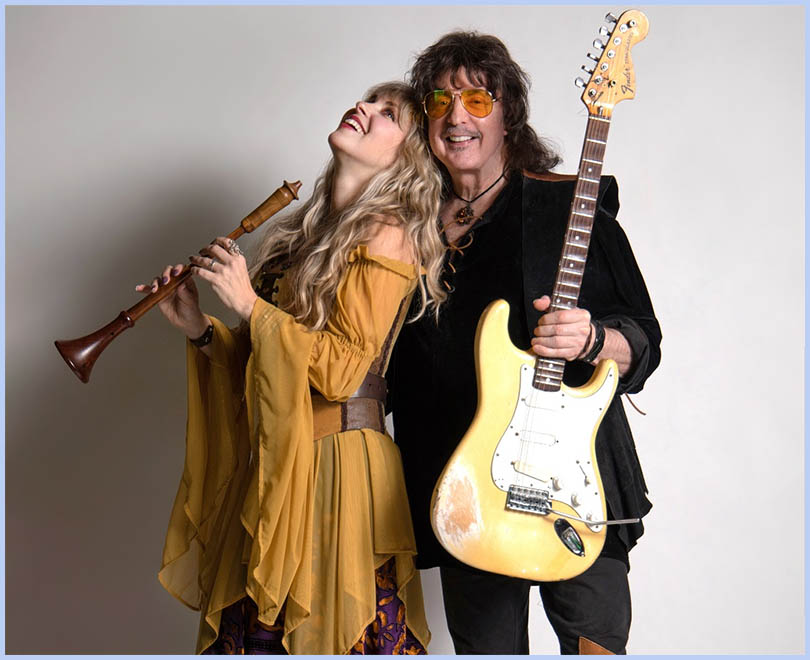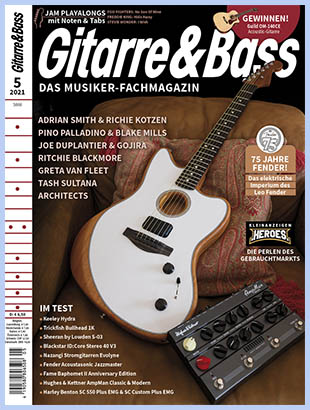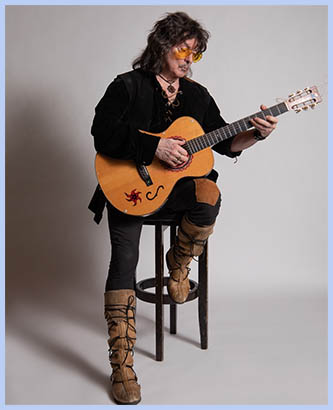|
Ritchie Blackmore Incorruptible  Ritchie Blackmore has probably never been completely uncontroversial. After leaving Deep Purple and founding Rainbow in 1975, things became a little quieter for the Brit, although his successes remained just as great. After a return to Deep Purple that lasted almost ten years and a subsequent Rainbow comeback, the idiosyncratic musician turned away from rock music completely in 1997 to form a folk band with his (now) fourth wife, based on predominantly acoustic instruments and inspired by the music of the Renaissance and Middle Ages.  Of course, Blackmore was also resented for this move and it reinforced his reputation as an incorrigible loner. In reality, however, Ritchie Blackmore is shy and reserved, which is sometimes misinterpreted as arrogance, but above all he is artistically incorruptible and not driven by the relentless pursuit of commercial success or unconditional fame.
Of course, Blackmore was also resented for this move and it reinforced his reputation as an incorrigible loner. In reality, however, Ritchie Blackmore is shy and reserved, which is sometimes misinterpreted as arrogance, but above all he is artistically incorruptible and not driven by the relentless pursuit of commercial success or unconditional fame.And so you should approach the new Blackmore's Night album 'Nature's Light' with an open mind, because regardless of whether you like the songs or not - music is a matter of taste - this album also shows the 76-year-old as a first-class composer, guitarist and unmanipulable artist who simply plays what he enjoys most, no matter how that may sound to outside ears. We got one of the very few interviews with Ritchie Blackmore, probably because we always had respect for him - and still do. So here is a conversation about acoustic and electric guitars, songwriting, tuning and sometimes sore fingers. Hello Ritchie, looking back on your career spanning more than 50 years, how has your playing and your musical knowledge evolved since you started playing predominantly acoustic guitars? The difference I noticed early on in my time with Blackmore's Night is that as an acoustic guitarist you can no longer rely on an amplifier and there are no technical tricks or effects to improve the sound of the instrument. Acoustic guitars are what they are, which is pretty unforgiving because you can't artificially blow up the sound with a distortion pedal. You just have the bare bones of the instrument in your hands, with no additional tools. This is obviously a huge challenge for a musician, but if you can get the acoustic guitar to obey your fingers, it is incredibly satisfying. The clarity of an acoustic guitar can be devastating, but it can also be absolutely exhilarating. Could you briefly describe what you learned during your heavy rock days with Deep Purple and Rainbow that helps you today with Blackmore's Night? Honestly? Not much. The music styles are just too different. What creates the typical Blackmore flair, the inimitable nature of your playing? I don't know. I'm not a musician who can imitate any other guitarist. I can hardly remember complicated harmonies or special arrangements. But I remember the basic melody. I play around with it, I play it the way I remember it, and I find my own guitar parts to go with it. I think that's why people keep saying that this or that song, this lick or that arrangement is typical for me. I couldn't play it any other way even if I wanted to. What criteria were decisive for you back then with Deep Purple and Rainbow when choosing your electric guitars? I started out with a Framus, then switched to a Höfner. After that I wanted to get a Gretsch, but the salesman recommended a Gibson ES-335 with dot inlays instead. I played that until 1971, then I got my first Stratocaster for $60 from a roadie who worked for Eric Clapton. I liked the sound right away, but unfortunately the action wasn't too good, so I started looking for a viable alternative and found another Strat that had a great attack and a wonderful cutting tone. But to be honest, it took me almost two years to get used to switching from Gibson to Fender. After you started concentrating on acoustic guitars, what other instruments did you subsequently discover for your playing and which of them have now become an integral part of your current studio and live equipment? My interest in Renaissance music has quickly made me aware of many other instruments that I play both on our albums and on stage. For example, the German folk band Poeta Magica gave me a nyckelharpa, which I often use live in concerts. I also now play the hurdy-gurdy, mandolin and mandoloncello. Did you find this difficult at first? Yes, my fingers weren't trained for it. And with the kind of music we're making now, jamming isn't really an option. Back in Rainbow and Deep Purple, we jammed a lot and for a long time. You had a few basic harmonies and just played over them whatever came to mind at that moment. With Blackmore's Night everything has a fixed structure. Everything is predetermined, you really have to know every arrangement, every note, every sequence of notes in your head. That's dangerous because people know the melodies, so you can't afford to make any mistakes. With Deep Purple we often played the wildest stuff without it sounding wrong. You let the guitar howl and squeak, and people were very impressed. That doesn't work with the acoustic guitar, you need a completely different way of playing. Ultimately, even a song like 'Smoke On The Water' conveyed influences that can be discovered today in Blackmore's Night, right? Indeed! That's because Renaissance music, like rock'n'roll, operates with very similar fifths and fourths. For example, if I reverse the chords of 'Smoke On The Water' or play them in a different order, you get structures that you can also find in Blackmore's Night. The difference is not that big in this case. Are instrumental numbers like 'Darker Shade Of Black' or 'The Last Musketeer' a kind of final refuge where you show your previous playing?  That's not the point. For me, the song always comes first, then the guitar. That's exactly what many of my colleagues can't understand. They ask: "Why is Ritchie doing that? Why doesn't he show off his guitar skills more? Like he did with Purple and Rainbow!" But I play for normal audiences, not just musicians. My audience wants to hear songs, not a wild guitarist who wants to show everyone what he can do. And even if I did that, there would immediately be tons of other guitarists who would say: "I can play that much faster." People would always make fun of me, no matter what I do.
That's not the point. For me, the song always comes first, then the guitar. That's exactly what many of my colleagues can't understand. They ask: "Why is Ritchie doing that? Why doesn't he show off his guitar skills more? Like he did with Purple and Rainbow!" But I play for normal audiences, not just musicians. My audience wants to hear songs, not a wild guitarist who wants to show everyone what he can do. And even if I did that, there would immediately be tons of other guitarists who would say: "I can play that much faster." People would always make fun of me, no matter what I do.What are your criteria when choosing acoustic instruments these days? Normally, the neck, its texture and size, is the most important criterion for acoustic guitars. I like it when the neck is as thin as an electric guitar. I love acoustic guitars because they produce a wonderfully warm sound. I don't like shrill sounds or when guitars sound too bright, which is something you hear more and more often these days. I like Indian rosewood for the back and sides of a guitar because this noble wood gives the instrument its pleasant warmth. On my guitars, I almost always replace the original frets with the largest Gibson frets possible. In addition, some of my acoustic guitars are scalloped, especially the custom models that Alverez Yairi built for me. How many electric guitars do you still own today, and how many acoustic instruments do you currently play in the studio and on stage? What is your current favorite acoustic guitar? I have now sold or given away most of my electric guitars, so I currently only own five or six. I don't believe in hoarding guitars when other people don't even own a single one. Some of my old guitars from my early days with Deep Purple, which had been in storage since the last tour, have since been stolen. As for my current instruments, I currently own around 14 acoustic guitars, eight of which I play regularly on stage or in the studio. The guitar I pick up most often when I play with Candice in small groups for good friends is a Lakewood, which has incredible resonance, so even when I'm just playing with Candice, it sounds like two instruments. Unfortunately, I haven't been able to play the guitar on stage with the whole band because it resonates too much. Luckily, I have a few other Lakewoods that were made especially for me, with thinner bodies and beautiful moon decorations. Milan Ciz also builds custom guitars for me that are more like a lute. Which strings do you prefer and what gauges? When we were touring with Deep Purple in the early 70s, supporting Cream, I met Eric Clapton backstage one day. Of course I asked him what strings he used. His answer was Clifford Essex. I played those strings for about five years. After that I switched to Welsh Picato strings and then, around 1980, to D'Addario. On my acoustic guitars I use the .012, .016, .022 or .024, .029, .039, .049 or even .052 for lower tuning. Can you tell us about the different tunings of your guitars? Which tuning is best for which type of song? I'm not one of those musicians who uses a different tuning on every instrument or every new song. I usually play in C and the band plays in D. I don't experiment too much as I struggle enough with normal tunings. There are only a few exceptions: sometimes I tune one of my guitars to drop D, like in 'Under A Violet Moon'. Which phase of your rock career is your songwriting today closest to? And which one is it most different from? To be honest, even in the past I almost always had Renaissance music in mind when I was composing, the only difference being that I always incorporated a little blues into my chord progressions. During my time with Deep Purple I often composed riffs plus the chord progressions to go with them and then let Ian Gillan find the melodies to go with them. So in that sense I had no idea how the melody would go when I was writing songs. But that changed later in my career. When I founded Rainbow in 1975 I automatically knew what the melody would be while I was composing. There were some significantly different compositional approaches between Deep Purple and Rainbow. Your general preference for the medieval music of Central and Southeastern Europe is clearly audible, not so much that of the Celts. Your new album 'Nature's Light' also seems to be influenced by Germanic sources. I don't know exactly why, but I feel that Germany is my second home. Sometimes I even think it's my first home. Almost all the composers we refer to were German. Johann Sebastian Bach has always been one of my greatest sources of inspiration, as has Mozart, and not to forget Beethoven. European music came to England via Spain, Italy, Hungary and Germany. Celtic music, on the other hand, came to Scotland and Ireland via Asia and Norway. It always has the same melodies, the same phrases. I don't particularly like that. I prefer the German composers. For me, there is something mysterious about Germany in particular that seems to inspire musicians. Just think that even the Beatles were in Germany when they took their first important steps. I like the mysterious, the bohemian. What inspires you today? Are there any current musicians that you particularly like? Has your taste in music changed in the last ten years? No, my taste hasn't changed much in recent years. I still get really excited when I rediscover Renaissance and medieval music. I still listen to the same records as I have for the past 20 years. There are certain bands that I never get tired of listening to, and I tend to always play the same pieces. For example, I like the Belgian band Nordman, which specializes in Viking music. I also like the German medieval band Des Geyers schwarzer Haufen, the Piffaro Renaissance Band from Pennsylvania, and The Baltimore Consort. Last question: Many years ago I bought an Engl Ritchie Blackmore signature amp, which I still have. Can you tell me a bit about it? I've never been known for playing particularly loudly on stage and have always preferred smaller 50 or 30 watt combos to the big Marshall amps. I always felt a little uncomfortable with the overly loud 200 watt Marshalls, even though they looked great. However, when I'm on stage I prefer a less dominant sound so I can hear the rest of the band. I like my sound to blend with the whole group's. I switched to Engl around 1993/1994, and even when we were putting together the Rainbow reunion shows a few years ago, I preferred to use a smaller 50 watt Engl. However, I still own a few Marshall amps, including the speakers. I probably have the loudest Marshall amp ever built, with an extra power boost from 200 to 280 watts, specially developed for the stage. Thank you, Ritchie, for the interesting conversation, and good luck with your new album 'Nature's Light'! © Matthias Mineur, Gitarre & Bass - May 2021 |